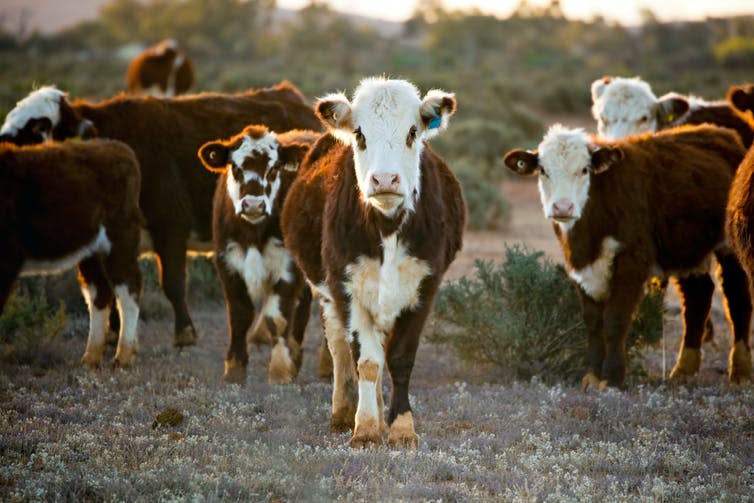The UK–Australia trade deal is not really about economic gain – it's about demonstrating post-Brexit sovereignty
As expected, the UK prime minister, Boris Johnson, and his Australian counterpart, Scott Morrison, have now agreed “in principle” to a free trade agreement. The fine details are still not out in the open, but the political and economic significance of the deal is becoming clearer.
The first point to note is the speed of the process. Negotiations were only launched in June 2020, so to have reached an agreement in principle in 12 months is fairly fast going. Significantly for the UK, it is also the first trade agreement negotiated since Brexit that is not a “rollover” of a pre-existing EU agreement or largely based on what was already available (as is the case with Japan.
That negotiations appear to have been straightforward is at least partly due to the fact that Australia is a relatively small and open economy. Even without a deal, it imposed relatively few barriers to trade and investment from the UK. This is why the UK government has had such a difficult time articulating what additional market access advantages it will actually gain.
By contrast, as a net exporter of agricultural goods, Australia sees the UK as an important market opportunity – especially for its beef, lamb, dairy and sugar products. Currently, access to the UK market is controlled by quotas, whereby only limited quantities can be imported without paying prohibitive tariffs.
Figures just released by the Australian and UK governments show how these exports are expected to change. Beef, for example, currently has a quota of 3,761 tonnes. This will be increased to a tariff-free quota of 35,000 tonnes immediately after the deal is in force, 110,000 tonnes after ten years and 170,000 after 15 years.
A similar plan applies to lamb, where imports are currently limited to 13,335 tonnes under the quota. This will go up to a tariff-free quota of 25,000 tonnes when the deal is enacted, 75,000 tonnes after 10 years and 125,000 tonnes after 15 years.
Critics have seized on these figures as evidence of “selling out” British farmers for a paltry £500 million – the maximum figure the government’s own analysis projects the deal will be worth to the UK over 15 years; around 0.02% of GDP.
Yet to reduce the deal to the simple matter of GDP is to misread the politics behind the UK’s post-Brexit trade policy.
The traditional problem that policy makers face when it comes to trade is that while a liberal approach is seen as economically optimal, the benefits tend to be widely dispersed while the costs – in this case, to farmers – are heavily concentrated.
Trade deals and trade offs
It’s a complicated and often thankless business, which is partly why the pursuit of free trade has frequently led governments to delegate the responsibility for negotiating trade deals to technocratic bodies – like the Office of the United States Trade Representative or the European Commission.
The UK is now different. Rather than delegating trade policy, it has done the opposite, taking responsibility away from technocrats in Brussels and handing it back to politicians in Westminster.

From this perspective, the fact that specific trade policies were hardly mentioned during the referendum campaign is not really relevant. Nor does it matter that, as one former Conservative cabinet minister claims, Brexiteer supporters of the Australian arrangement walked away from a “far more advanced deal” with the EU and only support free trade “when it suits them”.
Crucially, for a political campaign fought and won on the basis of “taking back control”, the key element is the very act of exercising sovereignty through an independent trade policy. For the current Conservative government then, the ability to strike trade deals is in itself far more important than the economic ends such deals may or may not achieve.
Seen in this light, boasting about “negotiating trade agreements covering 63 nations”, even though these uncontroversial deals do nothing more than maintain the status quo, makes sense.
But the UK is now leaving an initial, politically painless phase of trade policy independence. With the Australia deal, it is now entering a second and potentially more awkward phase.
Negotiating actual new trade deals will have real economic consequences and require politically difficult compromise. We are already witnessing the first signs of opposition to the Australia deal, as the details emerge.
These political conflicts are only likely to intensify as the UK moves on to negotiations with larger and more powerful trade partners like the US and India. Brexit has brought trade politics back to Whitehall – and there can be no more hiding behind the bureaucrats of the European Commission when unpopular decisions are made.
This article is republished from The Conversation under a Creative Commons license. Read the original article.

Tony Heron receives funding from the BBSRC, ESRC and Horizon 2020. He is currently serving and a Parliamentary Academic Fellow with the House of Common International Trade Select Committee. The views expressed in this article no way reflect the Committee or its members.
Gabriel Siles-Brügge receives funding from the Erasmus+ programme. He is currently a specialist adviser to the UK House of Commons International Trade Committee and Scientific Advisor on Trade Policy to the European Public Health Alliance (EPHA). The views expressed in this article are his alone and should not be taken to reflect those of the Committee and its members or EPHA.

 Yahoo News
Yahoo News 